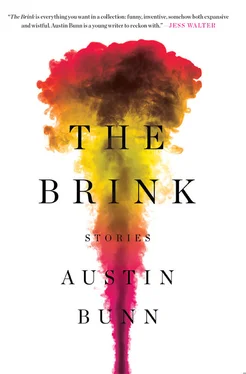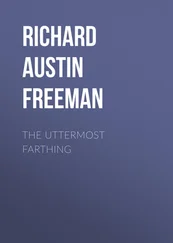By afternoon, the crew sends the longboat one last time over the drop. This time, they cut free the sea anchors and raise the mainsail for a broad reach. A westerly favors us, and even before our sails are half-raised, the Elena heaves forward with life. An enormous weight drags on us and hemp lines split, some tear from their braces.
Finally a Portuguese galleon crests through the spume, with dozens of people clutching to its deck. The Elena has towed it over. The white faces look as if they have survived a squall, as if they are amazed to be alive. Eventually the men of the galleon set its sails and drop more lines back into the roar.
They pull over a strange ship, this one low and open and driven by oars, with a high wooden dragonhead fixed at its prow. The two ships repeat this, and before long, the sea here becomes busy with boats, many unknown to me, and far outnumbering the Elena . The water carries the noise of weird cries. This motley army of the dispossessed, recovered from the ledge, soon fills the ocean as far as I see. At evening, we depart east together, toward home, sails bellied in the new wind.
My mother calls. “I have lichen,” she says. “On my vagina.”
What can be done? I am her daughter. I accept.
“Lichen is a woods thing,” I answer. “A hiking thing.”
My mother lives on the tenth floor of a high-rise that overlooks New York Harbor from a New Jersey bluff. She leaves only to shop, to return half of what she has bought, and to eat lunch at the Quick Check. She has not been hiking or on lichen or lichen-adjacent since before I knew what a vagina was. Her adventures are happy hours in the penthouse bar, where she counts the freighters and container ships in the harbor with Al, a retired sea captain.
“Well, the Internet says I have it inside me,” she says, “and you can’t tell a soul.”
It is Saturday morning. I open my garage door, the phone compacted between my ear and shoulder. Inside, the mausoleum of my marriage — the shelves and stacks and piles — greets me with a grim exhale. The papers arrived from the lawyer yesterday. Soon I will be officially divorced from Scott. I’m selling what I can.
“You have to come with me to the doctor,” my mother says.
Except I have buyers coming. I’m expecting to get money for my past life. The pleasure of seeing things go.
“This is your mother speaking,” she says. “This is your mother in need.”
What can ever be done?
I say, “Give me an hour.”
At noon a girl drives up in a pickup with her Mexican boyfriend. They saw my ad on Craigslist and are trying to outfit their life in a day. Already they look numb, zombified by exertion. She sucks the final drops from a Gallon Guzzler, pegging the ice with the straw for more. Her boyfriend wears a sweat-soaked, red and yellow T-shirt that reads “YALE.” I don’t think those are the colors, but things get random on the boardwalk. He massages her shoulders when she stands still. He is shorter and has to reach up a little. In the bed of the truck, a mint green refrigerator is lashed down haphazardly with straps, like an escape trick nobody wants to see.
“How come you want to get rid of so much awesomeness?” the girl asks, her fingers tracing the scalloped rim of a Waterford crystal bowl: a wedding gift that I used for loose change. Her boyfriend picks through a basket of shells and conches, carefully spaced and layered with towels, that I displayed in a glass cabinet at our old place. We lived a hundred yards from the shore, yet I thought we needed reminding about the ocean. My whole marriage felt like that, a reminder that the real thing was close and available but out of view.
“I left my husband four months ago,” I say. “All this reminds me of him. Of us.”
The girl glances over at her boyfriend. “Don’t tell him that,” she says, under her breath. “He’s wicked superstitious.”
I see their relationship unscroll in front of me — his fears, her fears of his fears, the double braid of accommodation and resentment — I want to tell her: Run . The divorced aren’t jaded. We’re clairvoyant.
The boyfriend presses two conches against his ears and grins. I say, “I give that basket to you. No money. Mi casa, tu casa .”
“He’s not retarded,” the girl says.
The boyfriend looks surprised, then honored, then seems to see the basket for what it is, which is a wicker container of beach trash, another weight he’ll have to carry. He deposits the conches and turns to a shelf of puzzles. I had a jigsaw period.
They leave with the crystal bowl, coffeemaker, nightstand, single mattress, artificial Christmas tree, and miter saw. Without asking, I carry the basket of shells to their truck. I smell the creamy coconut of suntan lotion and a funky undertone, brackish and tidal. Shards of sanded beach glass rumble like fogged irises inside a cookie tin. Scott and I lived at the beach for five years, and if you could watch just our beach episodes, we would look happy. Scott would fish in the surf or play his guitar, and I would read or just listen, jealous of his aptitudes. I’m a librarian at the elementary school; what I’m good at is cataloging. After every good time we had, I had an assignment for myself. I had to take one shell home, something singular. Proof that I’d felt loved, that I was experiencing what there was to experience. That display case was my own library, a library of moments.
I set the basket down in the truck bed and wonder what the girl will make of it. Will she see the bounty of the Jersey coast, or just me, a forty-one-year-old woman, alone and childless, her diseased mother for a best friend? I am her future. I want to tell her that after their marriage ends — after he cheats, or spends his days stoned, or gambling, or gets up from the table when she asks him for a child — she should pass the shells right on down to the next girl. Souvenirs from what happens later.
She peels the money from a roll as thick as her fist. “We don’t want your basket,” she says.
“Good,” I say, taking it back. “Because I don’t like your look.”
Dr. Stecopoulos is Greek, in his midthirties, and my mother adores him. Every time we’ve met, he seems as if he’s just come from an exam that he knows he’s aced. He patiently allows my mother to pry into his parents’ immigration, his years of school, his new marriage. After every detail, my mother throws a look in my direction: Thessaloníki! Isn’t Thessaloníki wonderful? He is my mother’s ideal man at a time when her interactions have become transactional. He has warm hands, walks her to the reception desk. He wears patent leather Italian shoes (“He doesn’t skimp,” my mother said), and tolerates her jokes, the signal flares of her personality.
She has her legs up in the stirrups, holding her breath, with her hands crossed over her belly. Dr. Stecopoulos probes indistinctly under the paper gown while I perch on a stool by his desk. A bluish plastic model of a uterus rests next to the computer monitor, and it looks drained and baleful, as if it doesn’t belong in the light. A little door is open in the front, a dollhouse entrance. What’s inside? A pink secret. I could crawl in and rest.
“Well, you were right,” the doctor says. “This is definitely lichen sclerosis.” He pokes his head up from under the gown. “Do you want to take a look?”
“Ah, no thank you,” I say.
“He wasn’t talking to you,” my mother says. He positions a mirror for her to see. I don’t want to look, not even by accident. My phone says I have a message from Scott. He got the papers too. The end is here, and I’m sure he wants to talk. I fiddle with the uterus model. The tiny door in front will not close properly, and I want it closed, in place.
Читать дальше











